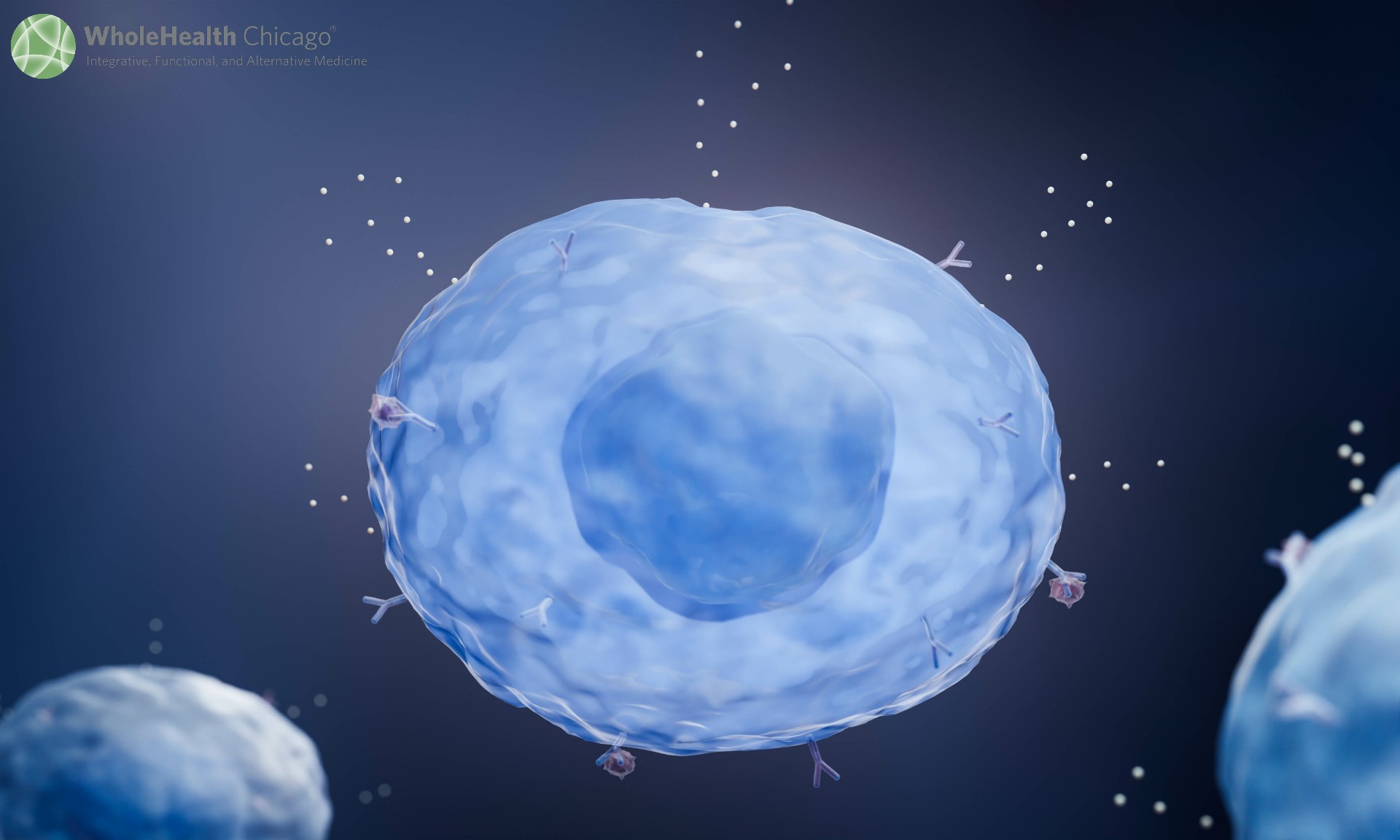Mast Cell Activation Syndrome (MCAS for short) is one of those annoying conditions in which a patient, after having read an article like this one and suffering similar symptoms, asks her doctor and gets one of two disappointing answers: “Never heard of it” (translation: MCAS is fairly new and often overlooked) or “Consulting Dr. Google again?” (Translation: MCAS is probably over diagnosed because there are no good tests for it. This phenomenon has occurred with candida for decades.
First, what are mast cells?
Mast cells are a special type of white blood cell manufactured in your bone marrow that travel just beneath the surfaces of your skin, moist mucosal surfaces like your respiratory tree (nose to lungs), and your digestive tract. Mast cells contain a variety of protective inflammation chemicals, most notably histamine. But like cayenne pepper, you only need a little histamine for its job to be done right. Overly irritate (or ‘activate’) a mast cell, it will burst, release too much histamine, and you’ll feel uncomfortable.
When there are a lot of potential mast cell irritants around (like during allergy season), they’ll trigger release of lots of histamine. You’ll reach for…you guessed it…antihistamines.
Sometimes, when the antihistamines can’t cover everything, doctors will add a ‘mast cell stabilizer’ (like Singulair a/k/a Montelukast) and you can guess what it does. Not neutralizing the histamine but rather preventing the histamine release.
But then, “something” goes wrong with this usually smoothly running system. It’s like the bar gets set too low to trigger this mast cell rupture and histamine release. “Activation” suddenly gets too easy. Patients who never had any allergies, or the mildest of allergy symptoms now have severe allergies, like hives, or food allergies (facial swelling, abdominal pain, diarrhea, wheezing, coughing, chest tightness). When a primary care doctor is told of these symptoms, she recognizes them as “allergies” and prescribes antihistamines and sometimes mast cell stabilizers. But very little else is suggested.
When more and more antihistamines and stabilizers still aren’t working, you yourself might discover someone who knows something about MCAS.
Doctors familiar with MCAS investigate your background and lifestyle. Here are some known triggers for MCAS:
- Extreme temperatures – either hot or cold.
- Exposure to mold or Lyme disease and co-infections.
- Emotional stress.
- Insect bites.
- Chemicals in personal products.
- Medications that liberate histamine.
- Sodium benzoate –a common food preservative.
- Foods or meds that lower diamine oxidase, an enzyme that breaks down histamine. A popular product to raise diamine is HistDAO available in our apothecary.
- Heavy metal toxicity – aluminum, mercury, lead, cadmium, bismuth and arsenic are known to be mast cell destabilizers.
- Anesthetics.
The blood tests for MCAS (measuring, for example, histamine, Tryptase, prostaglandins) are just not very accurate. MCAS is a clinical, not a lab test, diagnosis. Here at WholeHealth Chicago, we see most MCAS accompanying mold biotoxin illness (chronic inflammatory response syndrome), chronic Lyme Disease, and heavy metal toxicity. And now (wouldn’t you know?) MCAS is being increasingly reported as one of the numerous long COVID syndromes.
Treatment is geared toward the root cause (Lyme, mold, etc.); reduction of high histamine foods is helpful, but a very low histamine diet is too restrictive and quickly abandoned by even the most well intentioned patient.
Conventional medications are a combination of antihistamines and mast cell stabilizers. Especially useful is Gastrocrom, a tasteless liquid taken before each meal that coats the entire GI tract and stabilizes the mast cells lining it. The H2 (histamine 2) blockers like famotidine might be called in for stubborn cases.
Natural medicine’s well known dictum, “all illness begins in your gut”, is very true with MCAS, especially when you realize the lining of the gut has the largest population of mast cells, and your skin (after a moment’s thought) is simply a continuation of your intestinal lining.
In the few articles written about MCAS, conventional medicine calls it ‘incurable’ as long as you take enough antihistamines, mast cell stabilizers, and recently adding corticosteroids and monoclonal antibodies. None of the articles refers to treating the triggers and waiting for the condition to reverse on its own.
This to me makes functional medicine the best approach to solving the puzzle and getting to the root cause of this mysterious condition and reversing it.
Be well,
David Edelberg, MD
